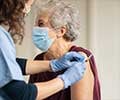Nearly 19 million children all around the world don't get vaccinated. The world immunization week, aims to rectify this problem as its only purpose is to highlight the need for every person to stay protected from vaccine-preventable diseases.
Highlights :
- World Immunization Week is aimed at highlighting the importance of immunization and filling the remaining gaps left in global coverage.
- It is observed during last week of April.
- This week, we look at ways in which individuals can drive the vaccination progress.
About The World Immunization Week
World Immunization Week is observed on the last week of April every year to highlight the importance of collective action, that is needed so that everybody stays protected from diseases that are vaccine-preventable. This year’s theme, 'Protected Together, VaccinesWork', has a bigger role to play than just to be repeated as a slogan. The purpose is to encourage people to get themselves vaccinated and push the message of immunization to others. For this to happen, the governments need to take up the responsibility of investing in immunization campaigns. These measures need to be backed by the government’s strong determination to prevent infectious diseases.Vaccinations are important because
- Infectious diseases can occur even when adequate levels of hygiene, sanitation, and clean water are maintained.
- If we do not maintain any optimum rate of immunization, infectious diseases like pertussis, polio and measles that have been successfully kept under control, could emerge once again.
Are Vaccines Safe?
Licensed vaccines are absolutely safe as they are vigorously tested clinically before they are officially out in the market. Most of the side effects like a sore arm or a mild fever are minor and temporary.These vaccines generally produce an immune response similar to the one produced by the natural infection, but they do not cause the diseases, nor do they put the immunized person at risk of potential complications.
They are safe for children. Ideally, at the time of birth children are sensitized to diseases early on, to prevent them from infectious diseases such as polio later on in life.
Children can also be given two more vaccines at the same time or a combination of vaccines such as diphtheria, pertussis and tetanus vaccine - DTP3.
- Global immunization cover has been stalled by 86% without any progess over the previous years.
- Nearly 19.5 million infants have been missing out on essential vaccines worldwide.
- In 2016, an estimated 116.5 million infants less than one received three doses of diphtheria-tetanus-pertussis (DTP3) vaccine.
- In 2016, another 19.5 million children did not receive this DTP3 vaccine. Almost sixty percent of these children were from underdeveloped or developing countries such Angola, Brazil, the Democratic Republic of the Congo, Ethiopia, India, Indonesia, Iraq, Nigeria, Pakistan and South Africa.
- Intense immunization efforts save nearly 2 to 3 million lives every year from infectious diseases such as diphtheria, tetanus, pertussis (whooping cough), and measles. An additional 1.5 million lives could be saved, if global vaccination coverage improves.
- Immunization helped the African population cope with Meningitis A; the vaccine is now being integrated into their routine national immunization programmes.
- New vaccine has been developed against dengue virus; it is going to pilot in three African countries in this year.
- Measles deaths have decreased by eighty-four percent from nearly 550,000 deaths in 2000 to 89,780 in 2016. Accelerated and intense immunization efforts have had a major impact in reducing measles deaths.
- Neonatal and maternal tetanus have been eliminated from WHO south-east Asia region in 2016 by the Tetanus toxoid vaccine.
References:
- Campaign Essentials For World Immunization Week 2018 - (http://www.who.int/campaigns/immunization-week/2018/campaign-essentials/en/)
- Immunization Coverage - (http://www.who.int/en/news-room/fact-sheets/detail/immunization-coverage)
- 10 Facts On Immunization - (http://www.who.int/features/factfiles/immunization/en/)











